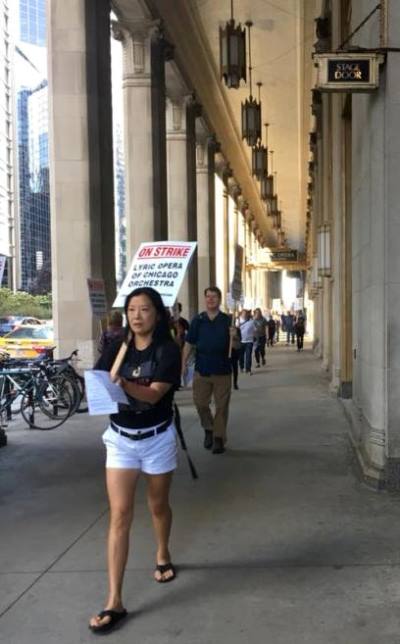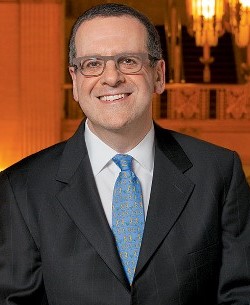Lyric Opera, striking orchestra reach accord, ending walkout; musicians ratify agreement

Waiting in the wings to open on Nov. 3 is the Lyric’s new production of Wagner’s “Siegfried,” third in the company’s developing “Ring” cycle.
UPDATE: The next opening scheduled at the Lyric Opera is Wagner’s “Siegfried” on Nov. 3. The strike has deferred Mozart’s “Idomeneo.”
By Lawrence B. Johnson and Nancy Malitz
Lyric Opera of Chicago and the Chicago Federation of Musicians Local #10-208 (CFM) have reached a multi-year labor agreement extending through the 2020/21 season. On Oct. 14, the Chicago Federation of Musicians voted to ratify the tentative agreement reached Oct. 13. No further details or comments were available.
The musicians went on strike Oct. 9 in response to cuts in compensation and work weeks sought by management. It was the first strike by the Lyric’s pit orchestra since 1967.
In a statement issued on the day of the strike, the members of the Chicago Federation of Musicians said they had walked out “because a world-class opera company needs a world-class orchestra. That is now in danger.”

Members of the Lyric Opera Orchestra went on strike Oct. 9 over the company’s proposed compensation package.
Lyric Opera management has said it must cut costs to ensure the company’s survival at a time when the demand for grand opera has declined. The company seeks to cut the number of guaranteed weeks for musicians of the orchestra to 22 from the current 24. Management also has proposed reducing the number of full-time musicians to 69 from 74 through attrition and to eliminate its radio broadcast as no longer affordable.
The strike, which comes a day after Lyric announced it had reached multi-year labor deals with the American Guild of Musical Artists (AGMA) and International Alliance of Theatrical Stage Employees (IATSE), eliminates the Oct. 11 performance of Puccini’s “La bohème,” the company’s season opener, as well as the Oct. 13 opening of the second production, Mozart’s “Idomeneo.”
Calling the strike “unnecessary and harmful,” the Lyric in a statement apologized “for the inconvenience and losses this disruption creates for our patrons, donors, partners and other dedicated employees.” But the company also said that “Lyric simply cannot agree to the terms CFM demands, given our current financial circumstances. Our proposed changes are necessary to ensure Lyric’s survival as a world-class opera company providing a diverse range of cultural entertainment to communities throughout Chicago.”
The striking musicians rejected management’s claims that the Lyric is financially stressed.
“Lyric exploded its budget in recent years, from $60.4 million in 2012 to $84.5 million in 2017 (the most recent year for which audited financials are available),” the musicians said in a statement. “But the Orchestra saw none of that $24 million increase. To the contrary, the Orchestra’s share of the budget has decreased steadily, from 14.6% in 2012 to 11.9% in 2017. If Lyric wants to make cuts, it is looking in the wrong place.
“Which also begs the question: where is that $24 million going? Management has never given us a straight answer. Certainly, that money did not go to the musicians of the Orchestra. Since 2011, our weekly salary has increased an average of less than 1% per year; and adjusted for inflation, our wages have actually decreased by 5.1% since 2011.”
The musicians took particularly sharp aim at Lyric general director Anthony Freud and the increases in his personal compensation.
“(Freud) saw a compensation increase of 18% from 2014 to 2017 – a raise of 16% in 2016 alone, right after the Orchestra musicians agreed to a cost-neutral contract with cuts to health care,” the union statement said. “And now he is leading the charge to gut the Orchestra. His demanded salary cuts alone would cost each musician in the Orchestra $6,000. Freud, with his $800,000 annual salary, gets paid that much every three days.”


